#Islamic Maghreb
Text
"Un café crème et une minute, voire deux, de réflexion. Nawel (1) est à la recherche des mots pour décrire ses sentiments. La trentenaire est «chargée de sécurité en ligne» pour un média social. Elle a «galéré» pour se faire embaucher. La faute à quoi ? Son nom, son prénom et sa religion, dit-elle dans une brasserie parisienne proche de la place de la République. «Je fais attention à ne pas tomber dans la colère parce qu’on nous refuse le droit à la colère. Elle est perçue comme une forme de violence alors que nous la subissons au quotidien.» Le «nous» englobe de nombreux Français musulmans diplômés. Ils dénoncent une atmosphère «pesante» dans le monde du travail, les médias et l’espace public. Ils ne supportent plus les regards de travers les jours qui suivent les attentats, la «suspicion» et les débats politiques. Une vie avec la «boule au ventre», disent-ils.
Aïcha (1) qui enseigne la littérature dans le Val-de-Marne garde encore en elle la souffrance lorsqu’un collègue lui a posé une question après l’attaque du Hamas en Israël le 7 octobre. Elle était installée en train de boire son café en pianotant sur son téléphone dans la salle des professeurs. Tout était calme. Puis : «Et toi Aïcha, tu es bien silencieuse, ça ne te fait rien ce qui vient de se passer ?» Elle a fondu en larmes dans sa voiture sur le chemin du retour. En arrivant à son domicile, Aïcha a demandé à son compagnon : «Pourquoi on reste encore ici alors qu’on pourrait être respectés ailleurs ?»
«On se bat pour se faire embaucher»
Le ressenti est documenté. Trois sociologues ont mené une enquête. Olivier Esteves, Alice Picard et Julien Talpin ont interrogé une partie de cette «élite minoritaire» – appuyée sur un échantillon quantitatif de plus de 1 000 personnes et sur 140 entretiens approfondis – qui a décidé de quitter la France pour s’installer à Londres, Dubaï, New York, Casablanca, Montréal. Ils ont en fait un livre, La France, tu l’aimes mais tu la quittes (Seuil). Les interrogés racontent les raisons de l’exil : discrimination, stigmatisation et difficultés à grimper dans le fameux ascenseur social. Libération a rencontré une dizaine de jeunes diplômés musulmans – pratiquants ou non – qui travaillent actuellement en France mais qui pensent chaque jour un peu plus à l’exil. Nous en avons également croisé qui ont passé le cap ; celui de vivre ailleurs.
Le recteur de la grande mosquée de Bordeaux, le médiatique Tareq Oubrou, perçoit le phénomène. «Le malaise est profond chez les musulmans et ne l’a jamais autant été. Il y a de grandes interrogations, une angoisse même face à l’avenir politique et social d’une France qui se crispe», explique cette figure de l’islam de France. Combien ont passé la frontière ? Les chiffres n’existent pas.
Salim est ingénieur dans la téléphonie. «J’en parle presque tous les jours avec des copains, dit-il en introduction. Nous sommes nombreux à ressentir la même chose. On se bat pour se faire embaucher et on galère pour être promu. Récemment, mon collègue qui a été nommé chef d’équipe a été gêné. Il n’arrive même plus à me regarder dans les yeux. Je suis arrivé avant lui et j’ai fait de meilleures écoles que lui. Je suis vu comme le mec sympa qui fait des blagues, qui devrait remercier chaque matin ses patrons d’être là.» Le trentenaire est en train de se laisser convaincre par son cousin à Londres. Il gagne le double de son salaire mais pas seulement. Salim regarde le plafond, s’évade et revient parmi nous : «Personne ne lui fait de réflexions pendant le ramadan ou après une attaque terroriste. Il n’est pas vu comme un arabe ou un musulman mais comme un ingénieur français.»
«Je me suis sentie entièrement française»
Dans la brasserie parisienne, Nawel commande un second café crème et déroule le câble de sa trajectoire. C’est la petite dernière des huit enfants de la famille. Ses parents ont quitté le Maroc à la fin des années 60 pour s’installer dans l’Yonne. Le daron à l’usine et la daronne avec la marmaille. La famille déménage un peu plus tard dans un petit village du Loir-et-Cher. «Mon père est devenu bûcheron. Les premiers temps étaient compliqués dans le village. Il y avait beaucoup de racisme, nous étions la seule famille arabe du coin. Mais notre famille nombreuse a sauvé l’équipe de foot, la fanfare et l’école du village.» Après un bac littéraire, la petite dernière se lance dans la sociologie. Elle se retrouve à Londres grâce au programme Erasmus. Tout change. «Je rencontre des gens du monde entier et plus personne ne me méprise, dit-elle. Je n’avais plus besoin de me justifier ou d’avoir honte de ce que je suis. Et, pour la première fois de ma vie, je me suis sentie entièrement française.» Cette dernière phrase reviendra souvent tout au long de nos rencontres avec les expatriés.
Nawel se cherche à son retour. Elle se lance dans le journalisme, un milieu où l’entre-soi est roi et la diversité (surtout dans les postes à responsabilité) un songe. Elle galère, enchaîne les petits jobs pour payer les factures. Elle décide de partir pour Dublin, en Irlande, où elle se retrouve – après avoir vendu des sandwichs – modératrice de contenus pour Facebook. Elle gravit les échelons en interne et change de boîte. Airbnb puis Twitter (devenu X). La vie est belle. Un bon salaire et des responsabilités. Nawel décide de rentrer en France après sept années en Irlande. «Je pensais que ça allait bien se passer. J’avais fait mes preuves dans de grosses boîtes, mais non. Je postule à un tas de trucs mais je n’ai aucune réponse. Je galère aussi pour trouver un appartement à Paris. J’avais des offres d’emploi toutes les semaines en Irlande et pas une depuis mon retour en France.» Elle ne lâche pas l’affaire. La «chargée de sécurité en ligne» décroche deux entretiens. Deux réponses positives. Elle ne croit pas au hasard : «J’ai eu un entretien avec un directeur des ressources humaines maghrébin et le second, c’était en visioconférence avec un Afro-Américain parce que c’est une entreprise américaine.»
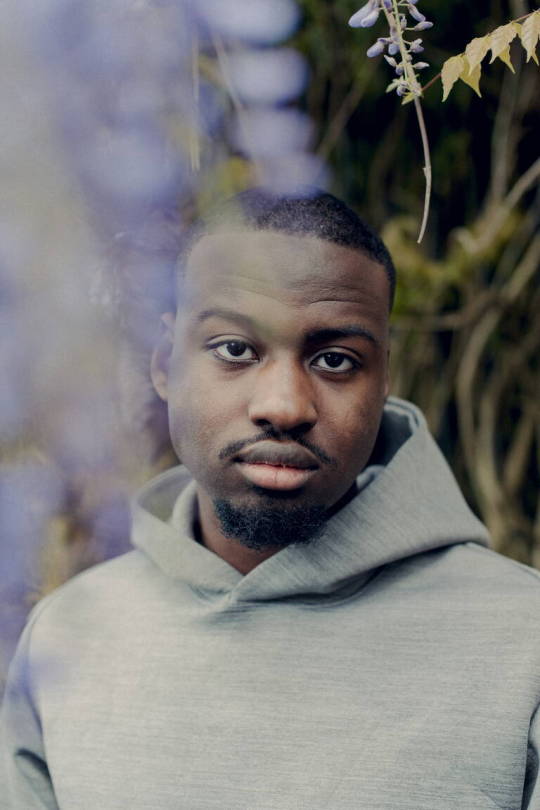
Pour Amara, 24 ans, la religion en France reste un «tabou», surtout dans le cadre professionnel. (Dorian Prost/Libération )
La jeunesse diplômée qui pense à l’exil se ressemble dans le regard de ceux qui mettent dans le même sac les enfants d’immigrés nés en France. «Nous sommes différents. Tous les Arabes ne sont pas musulmans et tous les musulmans ne sont pas Arabes, explique Salim. Et chez les croyants, les degrés de pratique varient mais de nombreuses personnes ne cherchent pas à comprendre.» Les pratiquants, notamment les femmes voilées, sont nombreux à se projeter loin de la France ; pas forcément dans des pays musulmans.
«On est obligés de cacher un peu notre identité»
Cap au Nord. Ils ont tous les deux un parcours brillant : étudiante en M1 dans une grande école lilloise pour l’une ; en dernière année de Centrale-Lille, cursus ingénieur en développement applications mobiles et web, pour l’autre. Fatima (1), 22 ans, a grandi à Roubaix, immigration de troisième génération. Ses grands-parents, habitants de l’Algérie française, sont arrivés en métropole dans les années 50. Amara, 24 ans, originaire de banlieue parisienne, a des parents venant d’Afrique subsaharienne : Côte-d’Ivoire pour le père, Guinée pour la mère. Tous les deux, si différents dans leur histoire, partagent le même désir d’ailleurs. «Rester reviendrait à vivre dans un pays où on ne se sent pas à 100 % acceptés», résume Fatima, voile kaki accordé à sa chemise vintage, chinée en friperie, et jeans blanc. Amara approuve : «Je voudrais trouver un pays où je peux pratiquer ma religion dans des conditions plus propices.» Il dit qu’en France, la religion reste un «tabou», surtout dans le cadre professionnel. Un regret ? «On est dans le pays où on a grandi, on fait la culture de ce pays, mais on est obligés de cacher un peu notre identité.»
Fatima souffre, elle, de l’image des musulmans issus des quartiers populaires. «On les associe dans l’imaginaire collectif à délinquance et à communautarisme. Et on nous confond avec des terroristes», soupire-t-elle. Le retour de Berlin, après un séjour Erasmus, a été dur. «Deux jours après, c’était l’annonce de l’interdiction de l’abaya. Je ne me sens pas vraiment concernée, je n’aime pas porter des robes, mais après Berlin, où tout le monde se respecte…» Elle porte le voile depuis trois ans. Dans son école lilloise, elle n’a subi aucune discrimination, de la part des profs comme des élèves. Juste parfois des étonnements maladroits quand on constate qu’elle ne parle pas arabe ou que ses parents sont français. Elle flippe pour les entretiens d’embauche. Elle a une autre peur, que l’extrême droite arrive au pouvoir. Pour ces raisons, elle prévoit de chercher du travail au Canada ou en Grande-Bretagne. «Soit on reste et on aide au développement de sa ville, soupire-t-elle. Soit on part, avec un sentiment de culpabilité. La France a investi sur moi, mais cela ne lui profitera peut-être pas. Je n’ai pas l’impression qu’elle se rende compte de cette perte.»
Amel a une phobie : l’avion. Elle traverse les mers et les océans pour rejoindre les différents continents. Elle a vécu un temps au Brésil. Puis un long moment à Dubaï. Elle raconte toujours un tas d’histoires. Ses traversées en cargo ou en voiliers. «J’ai toujours su que je quitterais la France après mes études, explique l’ancienne étudiante en école de commerce. Je n’ai jamais été une victime directe de racisme mais je sentais que j’aurais moins de barrières ailleurs et qu’on ne me jugerait pas.» Amel a créé plusieurs entreprises à Dubaï dans la cosmétique. Elle travaille aussi dans la finance. Dans un café du IIe arrondissement de Paris, la trentenaire pose une question qui paraît banale : «Pourquoi les choses ne changent pas ?» Elle ne cherche pas la réponse. Elle refuse de parler de «regrets» ou de «gâchis». Elle préfère dire «tant pis» pour la France. Son retour à Dubaï est programmé pour les prochaines semaines. Elle cherche un voilier pour embarquer.
Du racisme ordinaire devenu «monnaie courante»
Omar est ingénieur en informatique. Il a tout quitté du jour au lendemain pour la Californie. Une décision «difficile mais réfléchie», «contrainte aussi». Le trentenaire, fils de Marocains, est musulman pratiquant. Il y a six mois, il était encore «bien installé». Omar a traversé le monde pour s’établir à Los Angeles avec sa femme Nadia, 30 ans, chercheuse en biologie, et leurs deux enfants de 3 et 8 ans. La réponse à «une atmosphère islamophobe» devenue trop pesante. «Nos proches nous manquent, mais on ne veut plus se cacher par peur d’être jugés», dit-il. La réalité ? Un «incident» leur a fait franchir le pas l’an dernier. «Nadia a été dénoncée par des collègues car elle portait le voile dans son laboratoire.» Des questions de sécurité ont été mises en avant. Une «fausse excuse», selon Omar, qui insiste pour dire que sa femme travaille désormais dans l’un des plus grands hôpitaux de Californie «sans que cela ne leur pose de problème». Dans son entourage, leur cas n’est pas isolé, ses deux sœurs, dont il préfère taire la profession, sont parties en Angleterre pour les mêmes raisons.
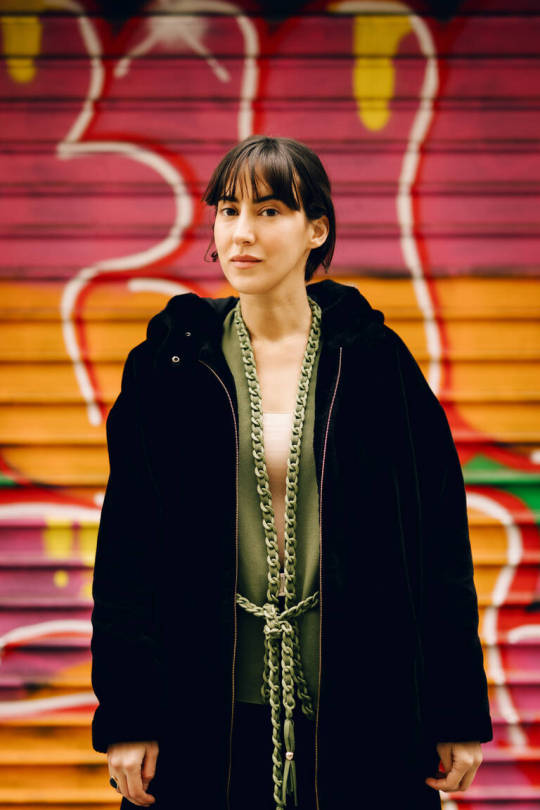
La trentenaire Amel a préféré dire «tant pis» à la France et partir vivre à Dubaï. (Marie Rouge/Libération)
Facky, lui, raconte un tas d’anecdotes. Diplômé d’école d’ingénieur l’an dernier, il a sauté le pas il y a quatre mois pour rejoindre le Japon. Une parenthèse pour le moment. Il compte y apprendre la langue, pendant un an, et, s’il s’y plaît, s’y installer définitivement. Ici ou ailleurs mais pas en France. «J’aime mon pays mais malheureusement je n’ai plus vraiment l’espoir de vivre sereinement quand on te répète tous les jours que tu n’es pas chez toi en France.» Il raconte des expériences. Du racisme ordinaire devenu «monnaie courante». Cette fois, lors d’un contrôle d’identité alors qu’il attend sa mère, où quatre policiers le mettent en joue par crainte de ce qu’il peut avoir dans son sac. Un flingue pointé sur sa tête. Ou alors, «moins grave», mais tout aussi «fatiguant», lorsqu’un caissier de supermarché refuse de passer ses articles. Dernier épisode en date, il y a un mois, dans l’avion le ramenant en France pendant le ramadan. Il explique au personnel de bord qu’il jeûne. Une femme, assise à portée de la conversation, juge bon de donner son avis : «On est au Japon ou à Kaboul là ?»
Dans la brasserie parisienne, Nawel regarde l’heure. Elle doit retourner travailler. La pause est terminée. Une ultime question : partir ou rester en France ? «Je parle cinq langues et j’ai fait mes preuves mais mon pays a du mal à reconnaître mes compétences. C’est triste. Nos parents sont venus ici pour travailler sans faire de vagues. Ils ont accepté beaucoup de choses que je ne pourrais jamais accepter.» Nouvelle hésitation. Nouveau silence. Puis : «Je n’ai pas envie de faire semblant ou de jouer à la meuf sympa pour me faire une place. C’est terminé cette époque. Peut-être que demain j’aurai des enfants et je ne veux pas qu’ils grandissent dans une ambiance ou il faut toujours montrer patte blanche ou se justifier.» "
(1) Les prénoms ont été modifiés.
#article copié en entier car réservé aux abonnés#rien ne me surprend dans cet article mais ça m'attriste...#racism#upthebaguette#whatthefrance#french side of tumblr#french#en français#maghreb#mena#arabe#islam#muslims
47 notes
·
View notes
Text

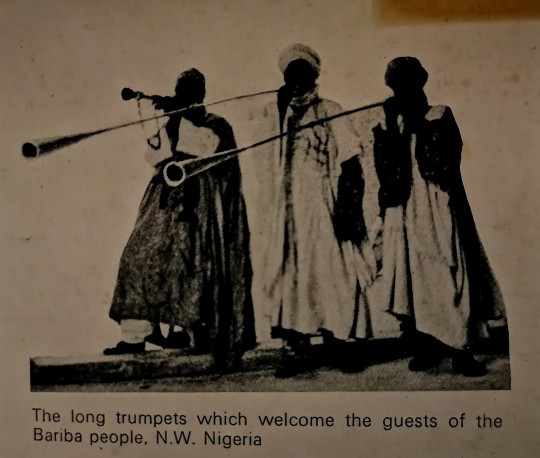


[rec. Jean JENKINS & Poul ROVSING OLSEN]
"Music in the World of Islam, vol.4 : Flutes & Trumpets"
(LP. Tangent rcds. 1976 / rec. 1960/70/75)
#compilation#1975#jean jenkins#poul rovsing holsen#islam#maghreb#africa#india#pakistan#iran#turkey#traditional#musicology#ethnomusicology#records#flute#trumpet#uganda
16 notes
·
View notes
Text
doing insane little experiments on the italian people in crusader kings
20 notes
·
View notes
Text
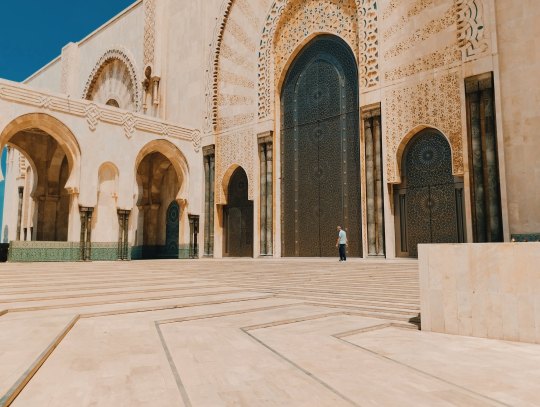
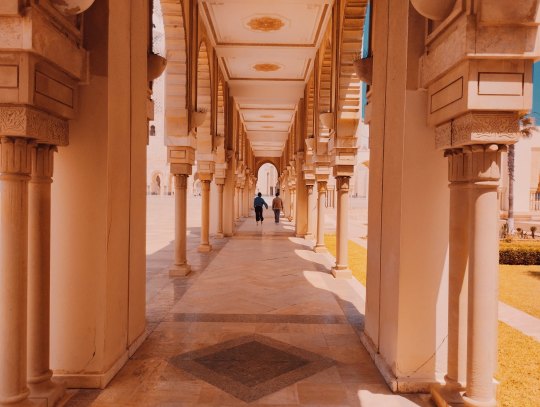
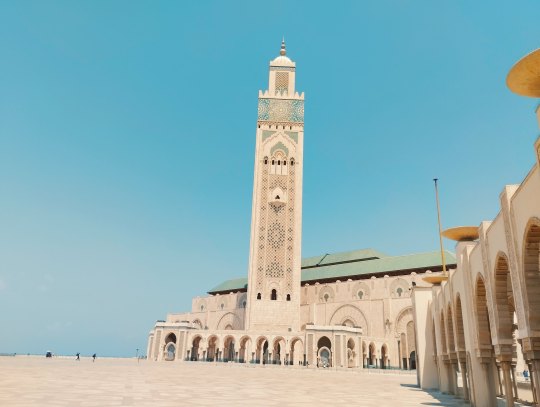

Casablanca (2) (3) (4) by TheBookofGinko
3 notes
·
View notes
Text
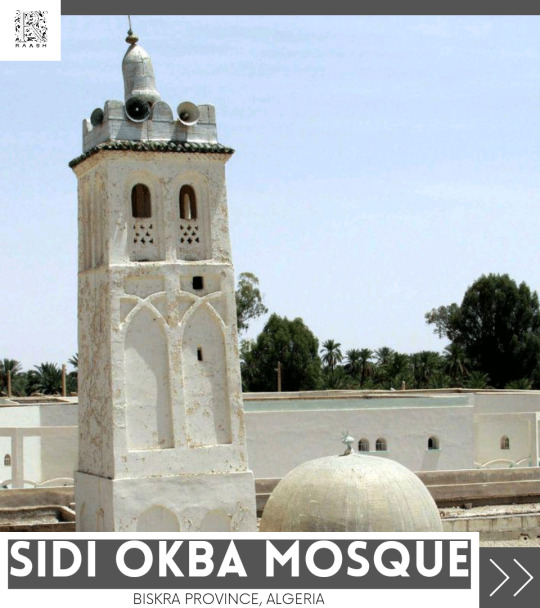

Sidi Okba Mosque is a historical mosque and the oldest mosque in Algeria. The mosque is located in the Sidi Okba commune in the Biskra Province, Algeria. It was originally built in 686 AD as a mausoleum for the great Muslim conqueror, Uqba ibn Nafi, a military commander and one of the most prominent leaders of the Islamic conquest of Morocco during the era of the Rashidun and Umayyad Caliphates.
#mosque#biskra#algeria#site#arab#general#islamic#conquest#maghreb#ancient#tradition#prophet#medina#arabic#inscription#character#modern#complex#shape#school#library#prayer#student#place#memory#raash#instagram#facebook#twitter#tumblr
2 notes
·
View notes
Text
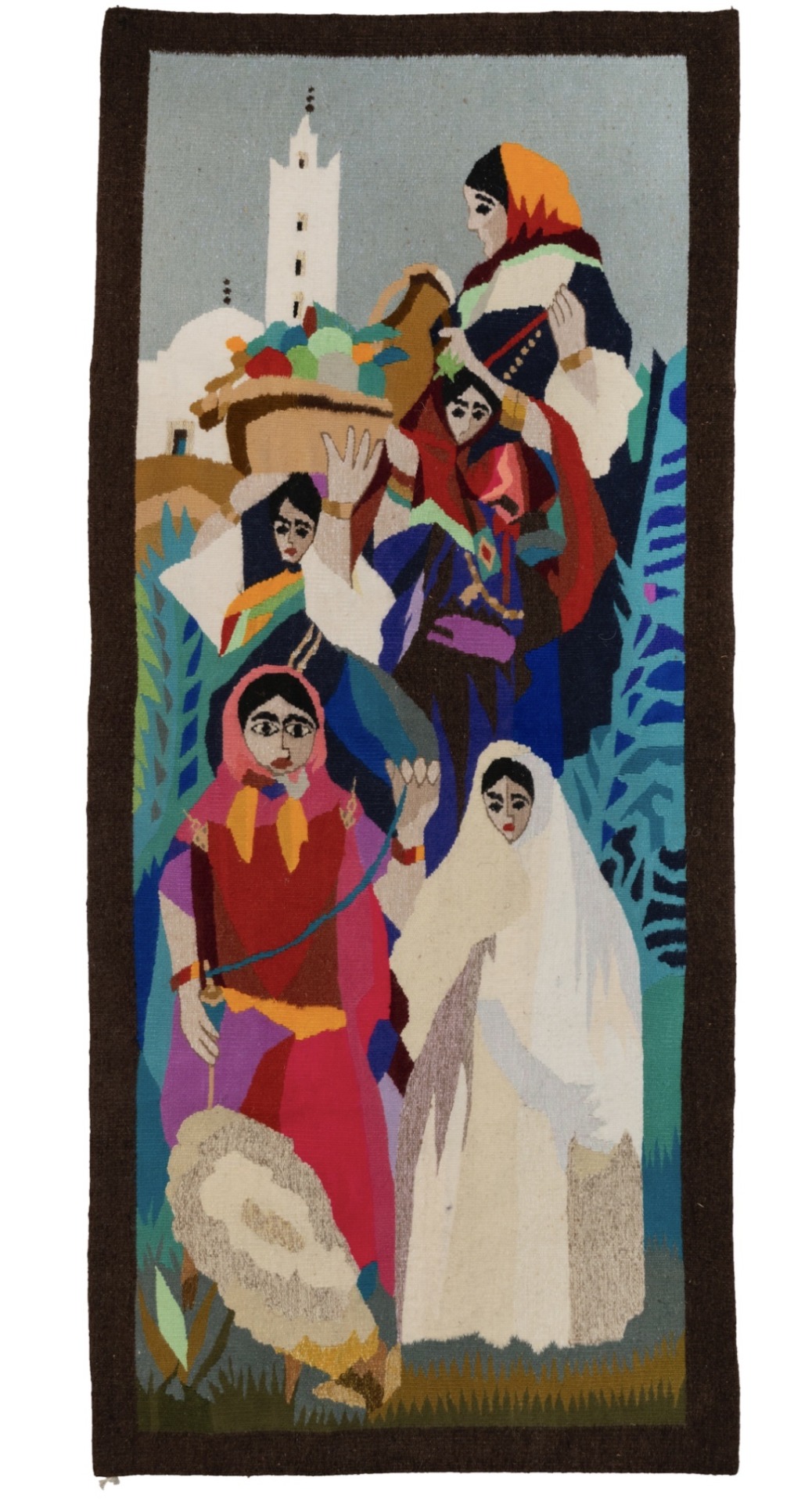
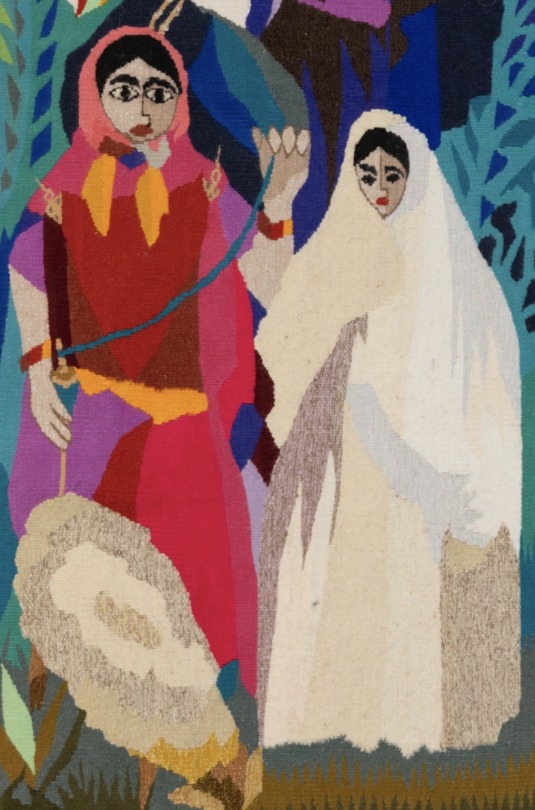
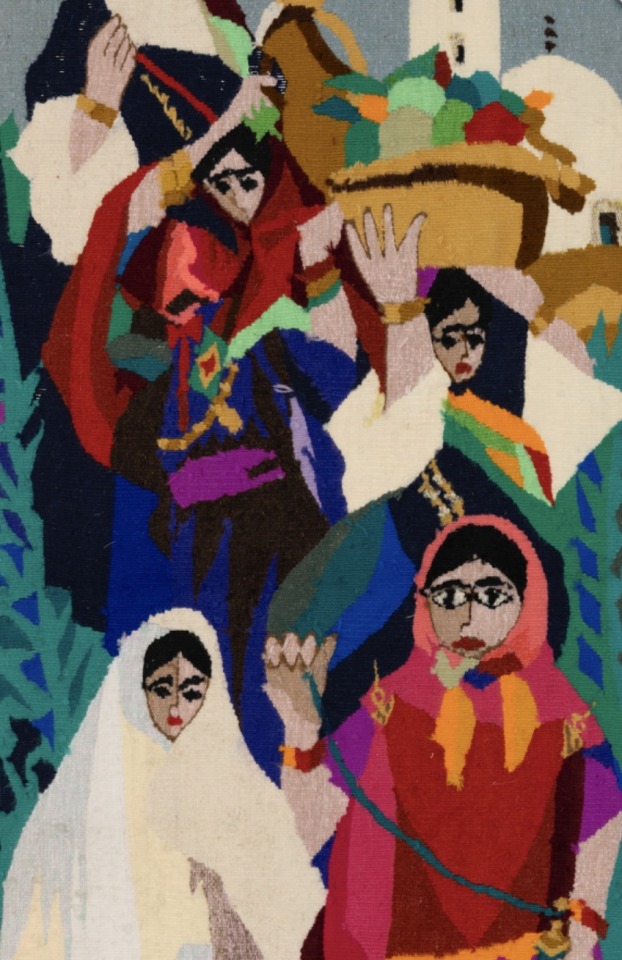
wool tapestry 'pictorial tapestry of five arab women" from tunisia / uw-madison's helen louise allen textile collection
#tapestry weaving#maghreb art#maghreb textiles#textile art#arab art#islamic art#ive been on a frantic research kick looking for info on maghreb weavings#i managed to find some pieces in an online collection at uw madisln#fiber art
0 notes
Text
Il PUNS perse tutta la sua credibilità quando nel 1975 il suo leader politico fuggì in Marocco
Fonte: http://www.africarivista.it
Il proposito di questo studio è quello di fornire una conoscenza basica della realtà del popolo saharawi, ed investigare alcuni degli aspetti sociali e politici della Spagna nel periodo compreso tra il 1973 e il 1991, rispetto alla problematica del Sahara Occidentale. I limiti cronologici di questo studio sono il 1973 e il 1991. Il primo, più precisamente il…

View On WordPress
#1973#1974#1975#21 Agosto#Africa#Algeria#arabo#Claudia Norbedo#colonialismo#F.L.U.#fronte#guerra#indipendenza#Islam#Maghreb#Marocco#Morehob#Movimento#nord#Occidentale#Polisario#popolo#PUNS#Sahara#Saharawi#Spagna
0 notes
Text
Il PUNS perse tutta la sua credibilità quando nel 1975 il suo leader politico fuggì in Marocco
Fonte: http://www.africarivista.it
Il proposito di questo studio è quello di fornire una conoscenza basica della realtà del popolo saharawi, ed investigare alcuni degli aspetti sociali e politici della Spagna nel periodo compreso tra il 1973 e il 1991, rispetto alla problematica del Sahara Occidentale. I limiti cronologici di questo studio sono il 1973 e il 1991. Il primo, più precisamente il…
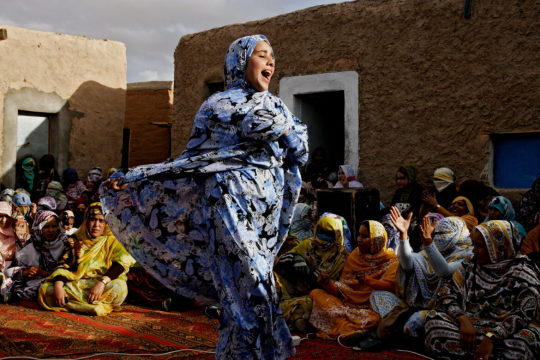
View On WordPress
#1973#1974#1975#21 Agosto#Africa#Algeria#arabo#Claudia Norbedo#colonialismo#F.L.U.#fronte#guerra#indipendenza#Islam#Maghreb#Marocco#Morehob#Movimento#nord#Occidentale#Polisario#popolo#PUNS#Sahara#Saharawi#Spagna
0 notes
Photo

Mira "Place principale de Cherchell au petit matin" de Bruno Malfondet que me gustó en flickr
#flickr#cherchell#tipaza#islam#mediterranean#destination#tipasa#islamic#culture#unesco#algerie#tourism#north#maghreb#africa#algerian#muslim#arabic#coast#arab#algeria
0 notes
Video
Emir Abdelkader Mosque, North Africa, Constantine, Algeria by Eric Lafforgue
Via Flickr:
© Eric Lafforgue www.ericlafforgue.com
#Africa#Algeria#Algeria-220669#Algerie#Architectural#Architecture#Building#Color image#Constantine#Copy space#Emir abdelkader mosque#Faith#Islam#Islamic#Islamic architecture#Local landmark#Maghreb#Minarets#Mosque#Muslim#No people#North africa#Outdoors#Photography#Place of worship#Places of interest#Religion#Religious#Spirituality#Symbol
0 notes
Photo

Map of Muslim Countries + Inscription (Islam) (in green) #islamiccountry #islam #islam❤️ #africa #asia #europe #الاسلام #אִסלַאם #middleeast #palestine #saudiarabia #maghreb #stancountry #afghanistan #pakistan #islamicquotes #islamismylife #findyourthing #redbubbletags #redbubblekits #redbubbleshoping #turkey #mali #senegal #nigeria #muslim #muslimworld https://www.instagram.com/p/ClYhZi1IKI3/?igshid=NGJjMDIxMWI=
#islamiccountry#islam#islam❤️#africa#asia#europe#الاسلام#א#middleeast#palestine#saudiarabia#maghreb#stancountry#afghanistan#pakistan#islamicquotes#islamismylife#findyourthing#redbubbletags#redbubblekits#redbubbleshoping#turkey#mali#senegal#nigeria#muslim#muslimworld
1 note
·
View note
Text

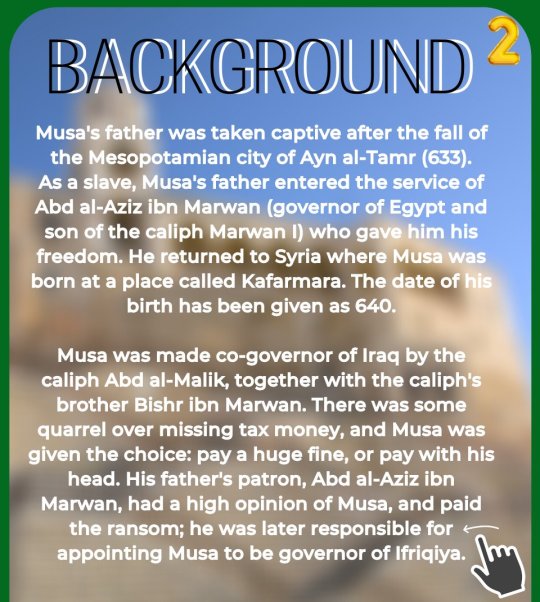

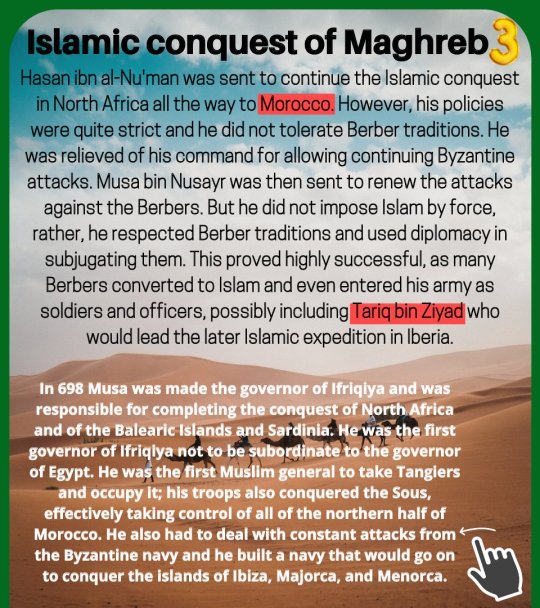


Musa ibn Nusayr served as a Umayyad governor and an Arab general under the Umayyad caliph Al-Walid I. He ruled over the Muslim provinces of North Africa, and directed the Islamic conquest of the Visigothic Kingdom in Hispania.
#musa#background#father#syria#filinta#iraq#islamic#conquest#maghreb#morocco#byzantine#governor#egypt#muslim#andalusia#capital#damascus#solomon#city#spain#arab#death#legacy#hajj#year#peak#north africa#africa#geographer#ibn battuta
0 notes
Text
Historically, Jews and Muslims have lived extremely peacefully when Muslims were the majority:
622 - 627: ethnic cleansing of Jews from Mecca
and Medina, (Jewish boys publicly inspected for pubic hair. if they had any, they were executed)
629: 1st Alexandria Massacres, Egypt
622 - 634: extermination of the 14 Arabian Jewish tribes
1106: Ali Ibn Yousef Ibn Tashifin of Marrakesh decrees death penalty for any local Jew, including his Jewish Physician, and Military general.
1033: 1st Fez Pogrom, Morocco
1148: Almohadin of Morocco gives Jews the choice of converting to Islam, or expulsion
1066: Granada Massacre, Muslim-occupied Spain
1165 - 1178: Jews nation wide were given the choice (under new constitution) convert to Islam or die, Yemen
1165: chief Rabbi of the Maghreb burnt alive. The Rambam (Maimonides) flees for Egypt.
1220: tens of thousands of Jews killed by Muslims after being blamed for Mongol invasion, Turkey, Iraq, Syria, Egypt
1270: Sultan Baibars of Egypt resolved to burn all the Jews, a ditch having been dug for that purpose; but at the last moment he repented, and instead exacted a heavy tribute, during the collection of which many perished.
1276: 2nd Fez Pogrom, Morocco
1385: Khorasan Massacres, Iran
1438: 1st Mellah Ghetto massacres, North Africa
1465: 3rd Fez Pogrom, Morocco (11 Jews left alive)
1517: 1st Safed Pogrom, Ottoman Palestine
1517: 1st Hebron Pogrom, Ottoman Palestine Marsa ibn Ghazi Massacre, Ottoman Libya
1577: Passover Massacre, Ottoman empire
1588 - 1629: Mahalay Pogroms, Iran
1630 - 1700: Yemenite Jews under strict Shi'ite 'dhimmi' rules
1660: 2nd Safed Pogrom, Ottoman Palestine
1670: Mawza expulsion, Yemen
1679 - 1680: Sanaa Massacres, Yemen
1747: Mashhad Masacres, Iran
1785: Tripoli Pogrom, Ottoman Libya
1790 - 92: Tetuan Pogrom. Morocco (Jews of Tetuuan stripped naked, and lined up for Muslim perverts)
1800: new decree passed in Yemen, that Jews are forbidden to wear new clothing, or good clothing. Jews are forbidden to ride mules or donkeys, and were occasionally rounded up for long marches naked through the Roob al Khali dessert.
1805: 1st Algiers Pogrom, Ottoman Algeria
1808 2nd 1438: 1st Mellah Ghetto Massacres, North Africa
1815: 2nd Algiers Pogrom, Ottoman Algeria
1820: Sahalu Lobiant Massacres, Ottoman Syria
1828: Baghdad Pogrom, Ottoman Iraq
1830: 3rd Algiers Pogrom, Ottoman Algeria
1830: ethnic cleansing of Jews in Tabriz, Iran
1834: 2nd Hebron Pogrom, Ottoman Palestine
1834: Safed Pogrom, Ottoman Palestne
1839: Massacre of the Mashadi Jews, Iran
1840: Damascus Affair following first of many blood libels, Ottoman Syria
1844: 1st Cairo Massacres, Ottoman Egypt
1847: Dayr al-Qamar Pogrom, Ottoman Lebanon
1847: ethnic cleansing of the Jews in Jerusalem, Ottoman Palestine
1848: 1st Damascus Pogrom, Syria
1850: 1st Aleppo Pogrom, Ottoman Syria
1860: 2nd Damascus Pogrom, Ottoman Syria
1862: 1st Beirut Pogrom, Ottoman Lebanon
1866: Kuzguncuk Pogrom, Ottoman Turkey
1867: Barfurush Massacre, Ottoman Turkey
1868: Eyub Pogrom, Ottoman Turkey
1869: Tunis Massacre, Ottoman Tunisia
1869: Sfax Massacre, Ottoman Tunisia
1864 - 1880: Marrakesh Massacre, Morocco
1870: 2nd Alexandria Massacres, Ottoman Egypt
1870: 1st Istanbul Pogrom, Ottoman Turkey
1871: 1st Damanhur Massacres,Ottoman Egypt
1872: Edirne Massacres, Ottoman Turkey
1872: 1st Izmir Pogrom, Ottoman Turkey
1873: 2nd Damanhur Massacres, Ottoman Egypt
1874: 2nd Izmir Pogrom, Ottoman Turkey
1874: 2nd Istanbul Pogrom, Ottoman Turkey
1874: 2nd Beirut Pogrom,Ottoman Lebanon
1875: 2nd Aleppo Pogrom, Ottoman Syria
1875: Djerba Island Massacre, Ottoman Tunisia
1877: 3rd Damanhur Massacres,Ottoman Egypt
1877: Mansura Pogrom, Ottoman Egypt 1882: Homs Massacre, Ottoman Syria
1882: 3rd Alexandria Massacres, Ottoman Egypt
1890: 2nd Cairo Massacres, Ottoman Egypt
1890, 3rd Damascus Pogrom, Ottoman Syria
1891: 4th Damanahur Massacres, Ottoman Egypt
1897: Tripolitania killings, Ottoman Libya
1903&1907: Taza & Settat, pogroms, Morocco
1890: Tunis Massacres, Ottoman Tunisia
1901 - 1902: 3rd Cairo Massacres, Ottoman Egypt
1901 - 1907: 4th Alexandria Massacres,Ottoman Egypt
1903: 1st Port Sa'id Massacres, Ottoman Egypt
1903 - 1940: Pogroms of Taza and Settat, Morocco
1907: Casablanca, pogrom, Morocco
1908: 2nd Port Said Massacres,Ottoman Egypt
1910: Shiraz blood libel
1911: Shiraz Pogrom
1912: 4th Fez Pogrom, Morocco
1917: Baghdadi Jews murdered by Ottomans
1918 - 1948: law passed making it illegal to raise an orphan Jewish, Yemen
1920: Irbid Massacres: British mandate Palestine
1920 - 1930: Arab riots, British mandate Palestine
1921: 1st Jaffa riots, British mandate Palestine
1922: Djerba Massacres, Tunisia
1928: Jewish orphans sold into slavery, and forced to convert to Islam by Muslim Brotherhood, Yemen
1929: 3rd Hebron Pogrom British mandate Palestine.
1929 3rd Safed Pogrom, British mandate Palestine.
1933: 2nd Jaffa riots, British mandate Palestine.
1934: Thrace Pogroms, Turkey
1936: 3rd Jaffa riots, British mandate Palestine
1941: Farhud Massacrs, Iraq
1942: Mufti collaboration with the Nazis. plays a part in the final solution
1938 - 1945: Arab collaboration with the Nazis
1945: 4th Cairo Massacre, Egypt
1945: Tripolitania Pogrom, Libya
1947: Aden Pogrom
#antisemitism#israel#terrorism#gaza#palestine#jumblr#ישראל#jewish#judaism#historic antisemitism#antizionism is antisemitism#Ottoman Palestine was NOT a great place for Jews
676 notes
·
View notes
Text
While there were periods of coexistence with Jews in the Levant, let this brief history disavow you of the notion, being promulgated all over the internet (and especially my inbox) that Jews were treated "well" by Muslims.
Similar in many ways to the dehumanization and murder at the hands of European Christianity, the Jews in Muslim-controlled lands, starting with Muhammad (exemplified in Islam as not just a prophet, but the "perfect example of human being") suffered continuous waves of ethnic-cleansing pogroms and massacres, culminating in the Massacres in southern Israel on October 7th.
This is a short list:
622 - 627: Ethnic cleansing of Jews literally from Mecca and Medina, (Jewish boys with pubic hair were executed along with the men). Over 800 adult males were killed by beheading. Women were forced into sexual slavery, and the children were given to Islamic Jihadis as slaves. Mohammad force-married Safiyyah, after murdering her husband and father.
629: 1st Alexandria Massacres of Jews, Egypt.
622 - 634: Exterminations of Arabian Jewish tribes.
1106: Ali Ibn Yousef Ibn Tashifin of Marrakesh decrees death penalty for any local Jew, including his Jewish Physician, and as well as his Jewish military general.
1033: 1st massacre of Jews in Fez, Morocco.
1148: Almohadin of Morocco gives Jews the choice of converting to Islam, or expulsion.
1066: Granada Massacre of Jews, Muslim-occupied Spain.
1165 - 1178: Jews of Yemen given the choice (under new constitution) to either convert to Islam or die.
1165: Chief Rabbi of the Maghreb was publicly burnt alive. The Rambam (Maimonides, Moses ben Maimon), forced to flee Spain to Egypt.
1220: Tens of thousands of Jews massacred by Muslims Turkey, Iraq, Syria, and Egypt, after being blamed for Mongol invasion.
1270: Sultan Baibars of Egypt resolved to burn all the Jews, a ditch having been dug for that purpose; but at the last moment he repented, and instead exacted a heavy tribute, during the collection of which many perished.
1276: 2nd Fez Pogrom (massacre) against Jews in Morocco
1385: Khorasan Massacres against Jews in Iran
1438: 1st Mellah Ghetto massacres against Jews in Morocco.
1465: 3rd Fez Pogrom against Jews in Morocco, leaving only 11 Jews left alive.
1517: 1st Safed Pogrom in Muslim Ottoman controlled Judea
1517: 1st Hebron Pogrom in Muslim-controlled Judea, by occupying Ottomans.
1517: Marsa ibn Ghazi Massacre of Jews in Ottoman-controlled Libya.
1577: Passover Massacre throughout the Ottoman Empire.
1588 - 1629: Mahalay Pogroms of Jews in Iran.
1630 - 1700: Yemenite Jews considered 2nd class citizens and subjugated under strict Shi'ite 'dhimmi' rules.
1660: 2nd Judean Pogrom, in Safed Israel (Ottoman-controlled Palestine).
1670: Expulsion of Mawza Jews in Yemen.
1679 - 1680: Massacres of Jews in Sanaa, Yemen.
1747: Massacres of the Jews of Mashhad, Iran.
1785: Pogrom of Libyan Jews in Ottoman-controlled Tripoli, Libya.
1790 - 92: Tetuan Pogrom. Morocco (Jews of Tetuuan stripped naked, and lined up for Muslim perverts).
1800: Decree passed in Yemen, criminalizing Jews from wearing clothing that is new or good, or from riding mules or donkeys. Jews were also rounded up for long marches naked through the Roob al Khali dessert.
1805: 1st Algiers Massacre/Pogrom of Jews in Ottoman-controlled Algeria.
1808: 2nd Ghetto Massacres in Mellah, Morocco.
1815: 2nd Algiers massacres/pogroms of Jews in Ottoman-controlled Algeria.
1820: Sahalu Lobiant Massacres of Jews in Ottoman-controlled Syria.
1828: Baghdad massacres/pogroms of Jews in Ottoman-controlled Iraq.
1830: 3rd massacre/pogrom of Jews in Ottoman-controlled Algiers, Algeria.
1830: Ethnic cleansing of Jews in Tabriz, Iran.
1834: 2nd massacre of Jews in Ottoman-controlled Hebron, Judea.
1834: Massacre/pogrom of Safed Jews in Ottoman-controlled Palestine/Judea.
1839: Massacre of the Mashadi Jews in Iran.
1840: Damascus Affair following first of many blood libels against Jews in Ottoman-controlled Syria.
1844: 1st Cairo Massacres of Jews in Ottoman-controlled Egypt.
1847: Dayr al-Qamar massacre of Jews in Ottoman-controlled Lebanon.
1847: Ethnic cleansing of the Jews in Jerusalem, Ottoman-controlled Palestine.
1848: 1st Damascus massacre/pogrom, in Ottoman-controlled Syria.
1850: 1st Aleppo massacre/pogrom of Jews in Ottoman-controlled Syria.
1860: 2nd Damascus massacre of Jews in Ottoman-controlled Syria.
1862: 1st Beirut massacre of Jews in Ottoman-controlled Lebanon.
1866: Massacre of Jews by Ottomans Kuzguncuk, Turkey.
1867: Massacre of Jews by Ottomans in Barfurush, Turkey.
1868: Massacre of Jews by Ottomans in Eyub, Turkey.
1869: Massacre of Jews in Ottoman-controlled Tunis, Tunisia.
1869: Massacre of Jews in Ottoman-controlled Sfax, Tunisia.
1864 - 1880: Massacres of Jews in Ottoman-controlled Marrakesh, Morocco.
1870: 2nd Alexandria Massacres of Jews in Ottoman-controlled Egypt.
1870: 1st Istanbul massacre of Jews in Ottoman Turkey.
1871: 1st Damanhur Massacres of Jews in Ottoman-controlled Egypt.
1872: Massacre of Jews by Ottomans in Edirne, Turkey.
1872: 1st Massacre of Jews by Ottomans in Izmir, Turkey.
1873: 2nd Damanhur Massacres of Jews in Ottoman-controlled Egypt.
1874: 2nd Izmir massacre of Jews in Turkey.
1874: 2nd massacre of Jews in Istanbul Turkey.
1874: 2nd massacre of Jews in Ottoman-controlled Beirut, Lebanon.
1875: 2nd massacre of Jews in Ottoman-controlled Aleppo, Syria.
1875: Massacre of Jews in Djerba Island, Ottoman-controlled Tunisia.
1877: 3rd massacre of Jews in Ottoman-controlled Damanhur, Egypt.
1877: Masaacres of Jews in Mansura, Ottoman-controlled Egypt
1882: Masacre of Jews in Ottoman-controlled Homs, Syria.
1882: 3rd Massacre of Jews in Ottoman-controlled Alexandria, Egypt.
1890: 2nd massacre of Jews in Ottoman-controlled Cairo, Egypt.
1890: 3rd massacre of Jews in Ottoman-controlled Damascus, Syria.
1890: 2nd massacre of Jews in Ottoman-controlled Tunis, Tunisia
1891: 4th massacre of Jews in Ottoman-controlled Damanahur, Egypt.
1897: Targeted murder of Jews in Ottoman-controlled Tripolitania, Libya.
1903 &1907: Masaacres of Hews in Ottoman-controlled Taza & Settat, Morocco.
1901 - 1902: 3rd set of massacres of Jews in Ottoman-controlled Cairo, Egypt.
1901 - 1907: 4th set of Massacres of Jews in Ottoman-controlled Alexandria, Egypt.
1903: 1st massacre of Jews in Ottoman-controlled Port Sa'id, Egypt.
1903 - 1940: Series of massacres in Taza and Settat, Morocco.
1907: Massacre of Jews in Ottoman-controlled Casablanca, Morocco.
1908: 2nd Massacre of Jews in Ottoman-controlled Port Said, Egypt.
1910: Blood libel against Jews in Shiraz, Iran.
1911: Masaacre of Jews by Muslims in Shiraz, Iran.
1912: 4th massacre in Ottoman-controlled Fez, Morocco.
1917: Baghdad Iraq Jews murdered by Ottomans.
1918 - 1948: Yemen passes a law criminalizing the raising of a Jewish orphan in Yemen.
1920: Massacres of Jews in Irbid Jordan (British mandate Palestine).
1920 - 1930: Arab riots resulting in hundreds of Jewish deaths, British mandate Palestine.
1921: 1st Jaffa (Israel) riots, British mandate Palestine.
1922: Massacres of Jews in Djerba, Tunisia.
1928: Jewish orphans sold into slavery, and forced toonvert to Islam by Muslim Brotherhood, Yemen.
1929: 3rd Hebron (Israel) massacre of Jews by Arabs in British mandate Palestine.
1929 3rd massacre of Jews by Arabs in Safed (Israel), British mandate Palestine.
1933: 2nd Jaffa (Israel) riots, British mandate Palestine.
1934: Massacre of Jews in Thrace, Turkey.
1936: 3rd riots by Arabs against Jews in Jaffa (Israel), British mandate Palestine.
1941: Masaacres of Jews in Farhud, Iraq.
1942: Muslim leader Grand Mufti collaboration with the Nazis, playing a major role in the final solution.
1938 - 1945: Full alliance and collaboration by Arabs with the Nazis in attacking and murdering Jews in the Middle East and Africa.
1945: 4th massacre of Jews by Muslims in Cairo, Egypt.
1945: Masaacre of Jews in Tripolitania, Libya.
1947: Masaacre of Jews by Muslims in Aden, Yemen.
2023: Massacre, rape, torture and kidnapping of ~1,500 Israelis (mostly Jews) by Muslims in numerous towns throughout southern Israel.
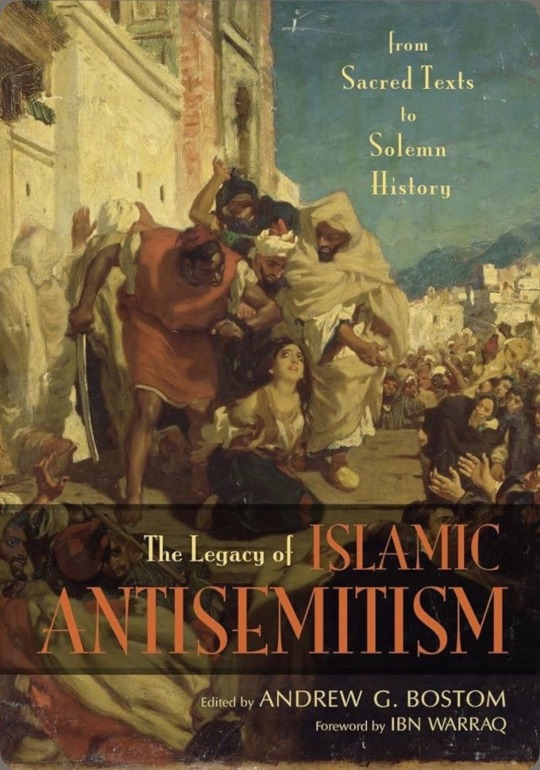
#secular-jew#israel#jewish#judaism#israeli#jerusalem#diaspora#secular jew#secularjew#islam#pogroms#massacres#massacres of Jews#Jewish massacres#Jewish pogroms#Hebron massacre#Hamas#Isis#Mohammad#Safiya#jew#jihadi#Judea
231 notes
·
View notes
Text
tips for writing muslim characters
except im a muslim, born and raised
dont mix it up with arab characters, yes a muslim can be arab and muslim but theres a difference. the link to my post abt writing arabs is here
first and foremost, not all muslims are arabs, and not all arabs are muslims. yes, most terminology and the holy book is in arabic, but that doesnt mean its exclusively arabs
indonesia (not an arab country) has the highest population of muslims worldwide
the arab country with the most christians is egypt, but the arab country with the highest population of christians is lebanon
not all practicing muslim women wear hijab (some extremely religious women might not wear a hijab)
five prayers a day: fajr (before sunrise), zuhr (midday), asr (afternoon), maghreb/maghrib (sunset), ishaa (nighttime)
call to prayer is known as 'azan', you can listen to it on youtube
muslims use the lunar calendar (known as the hijri calendar), which also has 12 months but its around two weeks shorter than the gregorian calendar. most people only remember the ninth month: ramadan
fasting consists of not eating/drinking from fajr until maghrib. you stop as soon as the azan for fajr sounds, and you can start again as soon as the azan for maghrib sounds. you fast for the entire month of ramadan, but its also encouraged to fast on mondays, thursdays, and the 14th/15th/16th days of each month of the hijri calendar
allah isnt the name of god. allah is the arabic word for 'god'
women dont have to cover up completely until puberty, athough some girls cover up before then and other women dont cover up at all
women can be religious and not cover up
the word 'hijab' doesnt show up in the quran, its 'khimar'. hijab is to cover up completely, not just hair. you cant wear a headscarf with a short sleeved shirt
men have to cover up too. from their navel to their knees absolutely has to be covered up, and (in most islamic cultures, not necessarily exactly religious) they cover up their chests as well
also men are told to avert their gazes from women more than women are told to cover up. youd find a lot of men in muslim countries not looking up from the floor when walking, especially in areas w a lot of women
kids by the age of eight can usually recite at least four chapters from the quran (the first one and the last three, mostly. it doesnt matter if theyre not arab)
if you want to use verses from the quran for whatever reason, i recommend quran.com
theres only one version of the quran. the same copy thats existed for 1400 years and millions of people have memorized it
on that note, people who memorize the quran are called hafiz, and there isnt a particular age. theres a three year old hafiz and a woman who didnt memorize it until age eighty three
there are two different sources for islamic law: the quran (holy book), and hadith (quotes of the prophet). dua' is completely different, its a prayer used to ask help from god, but unlike the five prayers, it doesnt really require a specific ritual. you just sit, face the direction of mecca, and say the dua'
superstitions are haram, but muslims do believe in black magic (its sihr in arabic and its one of the biggest sins) and djinn (there are djinn muslims but theyre widely regarded somewhat like monsters who encourage/help you to do black magic)
allahu akbar means "god is greater" or "god is the greatest". it isnt used as a signal to blow people up, and it isnt a term used purely by islam extremists
assalamu aleikum / waaleikum assalam mean, respectively, "peace be upon you" and "and peace be upon you too" basically just our way of just saying "hi" along with the reply
subhanallah means "glory be to god" usually when witnessing a miracle or when amazed
mashaallah - there arent any exact english equivalents but it means "what god wills". usually for compliments or to protect someone from evil eye
insha'allah - simply "god willing" but we use this when talking about the future (like "will you come to school?" "insha'allah" or "we'll get the gift, right?" "insha'allah"). can be replaced by the lesser used "bi'ithn illah"
alhamdu lillah - "praise be to god" or "thanks be to god. used in the way you might imagine, but also as a way to express that youre doing fine. "how are you doing today, sister?" "alhamdu lillah" (also when finishing a meal / finishing drinking water)
astaghfir ullah - "i seek forgiveness from god" whenever we see someone do something haram or when we ourselves do something haram and wish to repent
bismillah - "in the name of god" we use this whenever we begin something. a lot of arab literature starts with this. every chapter im the quran starts with this. every meal starts with saying this before eating
you can submit asks if you have any questions, but try to be a lil specific !!
feel free to rb with more info :)
#writing tips#muslim#writing muslims#writer sources#writing help#writers on tumblr#writeblr#writing advice
150 notes
·
View notes
Text
I love how generational my masjid is. You walk in and immediately on the right in the women’s area you are greeted with a circle of women all in their 30’s - 40’s sitting with one another for their Quran halaqa where they will stick around after for a cup of tea and you go down the hallway to the left to see the imam’s office filled with all old uncles in their 60’s talking about their latest Islamic book read while chowing down on some biryani one of their wives brought for the group and even further down that hallway is a class filled with elementary students learning their tajweed of the Quran, take it a floor below downstairs and you will see young adults in their 20’s there to meet up and socialize after a long day at work or college and the gym will be flooded with little children here to run around and play while their parents talk amongst each other at a table in the back and in the lounge room too close to the gym of loud children as the teens have loudly expressed to the masjid management you will find all the high schoolers sitting on the couches doing their homework and I will admit a decent amount of talking and make your way outside to see all the middle school boys are out engrossed in a game of soccer with our 19 year old soccer net and on some summer days an uncle will bring his grill over to feed all who came for Maghreb salah and other days all the families after fajr salah will embark on a bike ride on a trail near the masjid with the young children speeding up to the front and their parents huffing behind them trying to catch up.
#I love how involved my community is in our masjid#but not only that#this involvement is from so many of our generations#it’s so beautiful to see such an active and thriving community#of course we still have many ways to go#and our shortcomings#but alhumdillah for what we do have#m’s mind#muslim blogging
14 notes
·
View notes